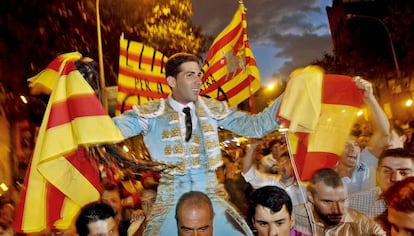Spain¡¯s Constitutional Court overturns Catalan ban on bullfighting
Judges rule that Catalonia overstepped powers by prohibiting activity outright

Spain¡¯s Constitutional Court has overturned a ban on bullfighting in Catalonia introduced by the northeastern region¡¯s parliament in 2010, calling it unconstitutional.
In a ruling that saw judges voting 8 to 3 in favor of overturning the measure, the court said that while Catalonia had the power to regulate bullfighting, it could not prohibit the activity outright.
The Catalan law fell foul of the tribunal because it didn¡¯t regulate bullfighting but prohibited it point-blank
The Catalan ban is unconstitutional, the court argued, because bullfighting had been declared part of Spain¡¯s cultural heritage in national laws introduced in 2013 and 2015 by the conservative Popular Party (PP) government of Mariano Rajoy.
In the ruling, which was made public on Thursday, the Constitutional Court upheld the arguments outlined in an appeal lodged against the ban by the PP in 2010. In the appeal, the PP argued that Spain¡¯s regions did not have the power ¡°to prohibit bullfights, which are protected by national and European laws,¡± and that the Catalonia ban ¡°contravened five articles of the Spanish Constitution.¡±
The PP appeal also saw the party defend bullfighting as a cultural, historic, social, economic and industrial activity and said that its legislative framework was a matter for the central government.
The problem was that ¡°the Catalan law does not limit itself to regulating bullfighting in terms of its practice and development, but rather prohibits it point-blank.¡±
From 2007 to 2014, the number of bullfights held in Spain each year dropped from 953 to 398
Pressure from nationalist, pro-independence forces was mostly behind the ban in the region, along with an increasing lack of interest from the public. Interestingly, the ban did not affect the correbous, a bull running when flares or flaming torches are attached to a bull¡¯s horn ¨C a long-standing tradition in Catalonia.
Bullfighting remains deeply controversial in Spain, with many saying the spectacle is antiquated and pointing to its declining popularity.
From 2007 to 2014, the number of bullfights held in Spain each year dropped from 953 to 398, according to the Culture Ministry.
The bullfighting sector plays down the 60% drop, largely blaming the long economic slump: ¡°Just like other cultural activities, we have been affected by the crisis,¡± said Carlos N¨²?ez, president of the Union of Fighting Bull Breeders (UCTL) in 2015.
In August 2015, San Sebasti¨¢n hosted its first bullfight after a three-year gap, making the Basque city one of the few to reinstate the tradition. The industry has pointed to a slight uptick in the number of events since 2014.
But animal-rights groups say the decline is terminal: ¡°We are seeing the beginning of the end of corridas,¡± said Jos¨¦ Enrique Zald¨ªvar, president of Avatma, an organization that represents vets opposed to bullfighting.
English version by George Mills.
Tu suscripci¨®n se est¨¢ usando en otro dispositivo
?Quieres a?adir otro usuario a tu suscripci¨®n?
Si contin¨²as leyendo en este dispositivo, no se podr¨¢ leer en el otro.
FlechaTu suscripci¨®n se est¨¢ usando en otro dispositivo y solo puedes acceder a EL PA?S desde un dispositivo a la vez.
Si quieres compartir tu cuenta, cambia tu suscripci¨®n a la modalidad Premium, as¨ª podr¨¢s a?adir otro usuario. Cada uno acceder¨¢ con su propia cuenta de email, lo que os permitir¨¢ personalizar vuestra experiencia en EL PA?S.
?Tienes una suscripci¨®n de empresa? Accede aqu¨ª para contratar m¨¢s cuentas.
En el caso de no saber qui¨¦n est¨¢ usando tu cuenta, te recomendamos cambiar tu contrase?a aqu¨ª.
Si decides continuar compartiendo tu cuenta, este mensaje se mostrar¨¢ en tu dispositivo y en el de la otra persona que est¨¢ usando tu cuenta de forma indefinida, afectando a tu experiencia de lectura. Puedes consultar aqu¨ª los t¨¦rminos y condiciones de la suscripci¨®n digital.









































